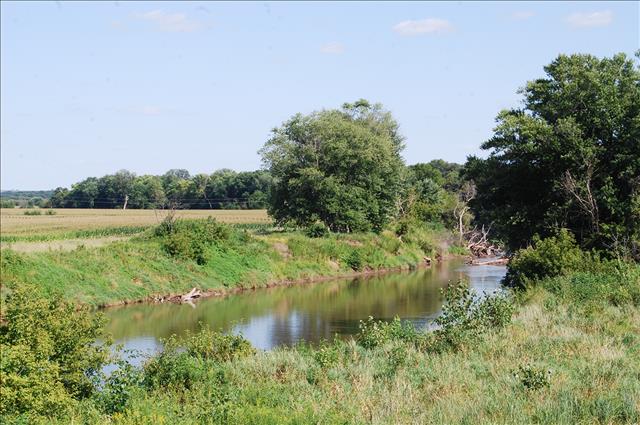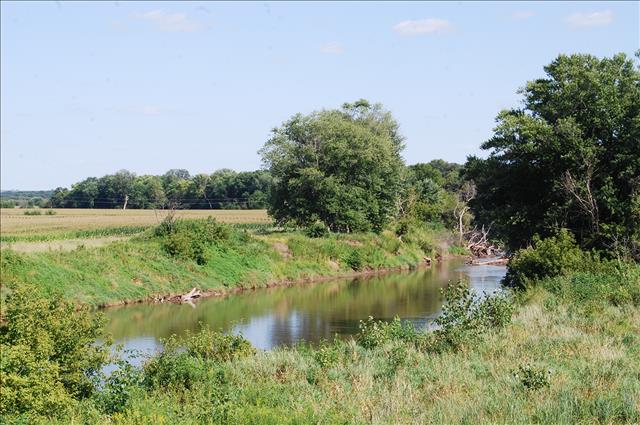September 10, 2015

The Iowa Partnership for Clean Water, a new organization formed this past spring, hosted a water quality roundtable in Des Moines in late August. The panel discussed how to best engage Iowa farmers in the Iowa Nutrient Reduction Strategy, and how to maximize success in improving water quality in Iowa while uniting rural and urban citizens to work together.
The nutrient reduction strategy is only two years old but is beginning to show real momentum even though many of the practices it calls for, such as cover crops or saturated buffers, are new and unfamiliar to most farmers, the panelists agreed. That is, all but one of the panelists, Bill Stowe the head of Des Moines Water Works.

EDUCATION PHASE: The Iowa Nutrient Reduction Strategy, only two years old, is gaining momentum and showing promise in reducing losses of nitrogen and phosphorus from fields. It's taking uncommon farming practices for farmers and is making them more common.
Farmers, communities committed to making the plan work
The other community leaders and state environmental and ag officials say Iowa is starting to see a real ramp-up in the use of conservation practices and they think farmers and communities are committed to making this plan work. They pointed out that Iowa is still very much in the educational phase, "where we are taking uncommon practices for farmers and making them more common."
Panelists were Jay Byers, executive director of the Greater Des Moines Partnership; Steve Hershner, utilities director for the City of Cedar Rapids; Mike Naig, deputy director of the Iowa Department of Agriculture & Land Stewardship; Bill Stowe, CEO of Des Moines Water Works; and Bruce Trautman, deputy director of the Iowa Department of Natural Resources. Moderator was Ron Corbett, mayor of Cedar Rapids. Opening remarks were delivered by Corbett and the rest of the Iowa Partnership for Clean Water board: former Iowa Lt. Governor Patty Judge, Des Moines City Councilwoman Christine Hensley and Plymouth County Supervisor Don Kass.
Why farmers want to keep nutrients in fields
Stowe made his stance very clear: "Iowa is in a water quality crisis and agriculture is the prime contributor to that crisis," said Stowe, who favors more government regulation to force farmers to use more practices to reduce nutrient runoff from fields and tile lines.
Farmers across the state would refute Stowe's claim, countered Naig. Most disagree with the notion that farmers' actions are overwhelmingly the cause of high nitrate levels in streams and rivers.
Farmers spend money on fertilizer and want to keep it in the field where it provides a return on investment. A lot of the nitrate in tile water and drainage ditches originates from naturally occurring microbial processes which release nitrogen from the organic matter in Iowa's fertile soils.
"It's important that everyone, rural and urban, take ownership in helping solve the water quality issue," said Naig.
Purpose of Iowa Partnership for Clean Water
That's why the Iowa Partnership for Clean Water was formed. The group is opposed to a lawsuit filed by Des Moines Water Works against three rural counties in March. The suit contends drainage districts in Buena Vista, Calhoun and Sac counties in northwest Iowa are sending nitrate from farm fields into the Raccoon River, one of two sources of drinking water for Des Moines and 500,000 central Iowa residents. The Des Moines River is the other water source. The suit says the drainage districts and farmers aren't doing enough to prevent nutrients from leaving fields.
Stowe says his utility has spent $1.5 million over two years running nitrate removal equipment that's needed to make drinking water safe for its customers. Attorneys for the three counties where the drainage districts are located are seeking to have the lawsuit dismissed.
A science-based plan to improve water quality
All the panelists agreed the science is sound behind the Iowa Nutrient Reduction Strategy, a statewide effort developed and introduced by the Iowa Department of Agriculture, Iowa Department of Natural Resources and Iowa State University in 2013.
The plan promotes increased use of cover crops, buffer strips, grass waterways, bioreactors and other practices that help keep nutrients from entering streams. It aims to reduce rural and urban nitrogen and phosphorus loads statewide by 45%.
Stowe says the nutrient reduction strategy is ineffective and the problem is it's voluntary and has no deadline for reaching its goals. Naig counters that a voluntary approach spurs innovation and new practices in agriculture. The strategy is only two years old and needs more time to be carried out. The DNR's Trautman agrees.
"It's going to take a great deal of time before we reach the goals outlined in the strategy," he said. "These nutrient reduction practices work. But will the voluntary approach work fast enough? That's what's being debated."
Revenue needed for more conservation practices
The DNR enforces environmental regulations in Iowa. Trautman and others on the panel cited a shortage of resources in the public and private sectors. It's estimated that $4 billion is needed to fully implement the Iowa Nutrient Reduction Strategy. At the current rate of investment it will take centuries to meet the goals.
We need to create new revenue sources and incentives for conservation and harness the economic drivers that incentivize conservation practices so we can achieve these ambitious goals in a matter of a few decades.
"In Cedar Rapids, we are working with farmers in surrounding watersheds to address water quality issues," said Corbett. "I've seen firsthand that collaborative solutions work in bridging the gap between rural and urban Iowa and pave the way for lasting conservation and water quality impact. Residents and farmers in watersheds across the state will support similar approaches."
It's better to have collaboration than litigation
The panelists discussed long-term solutions that are making an impact under the nutrient reduction strategy and how best to keep awareness of and expand innovative rural and urban projects, like the Middle River Partnership Project, Deep Creek Water Quality Initiative, and more.
"Iowa's Nutrient Reduction Strategy sets ambitious goals to minimize nutrient loss and prevent soil erosion and outlines key strategies to meet those goals," said Judge. "The improvement of water quality is a long-term goal that will take long-term solutions and commitment from all Iowans."
Everyone has ownership, everybody has a role to play in contributing to the solution, added Naig. "That is really one of the core elements of how this nutrient reduction strategy came together. Its strength is the fact that urban and rural communities can work together to solve this issue."
Water quality isn't just an ag issue, cities play a role
"One of the things DNR is doing is leading by example on conservation efforts," said Trautman. "That's the right thing to do and we are seeing some good progress in working with farmers." Added Kass, who is also a farmer: "We have great participation in watershed projects and conservation projects in and around Plymouth County. We'd like to continue moving these collaborative efforts and our state forward in a smart, targeted way, without assigning any undue burden on Iowa farmers."
Des Moines city councilwoman Hensley said, "Water quality is not just an ag issue. Cities play an important role in maintaining high water quality for both residents and Iowans downstream. Urban and rural residents alike must be at the table having these discussions to make meaningful changes."
The Iowa Partnership for Clean Water plans to continue bringing together Iowans from public and private, urban and rural, and ag and industrial sectors to continue the discussion.
For more information, visit iowapartnershipforcleanwater.org.
About the Author(s)
You May Also Like






